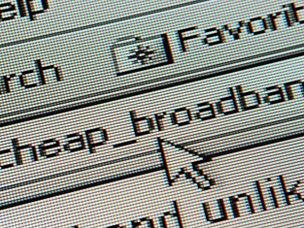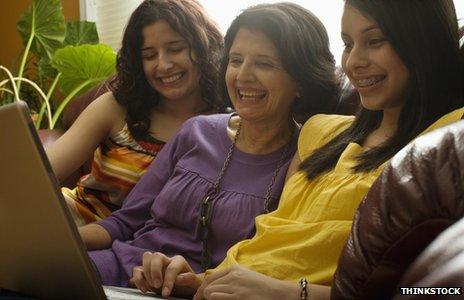Broadband: Readers' bad and good experiences
- Published

A recent BBC News Magazine article looked at why home broadband in the US costs far more than most other places around the world.
In response to the article, readers have been sharing their broadband experiences. Here is a selection of their negative and positive stories.
10 unhappy customers...
Ricky, Johannesburg, South Africa: In South Africa, the fastest speed that is apparently available is 40 Mbps [megabits per second]. I am yet to experience this as the average available here is around 1 Mbps). The cost of this 40 Mbps uncapped broadband offer is - wait for it - 3,656 rand [£224 or $371 per month]. So, in actual fact, compared with South Africa, the US is really cheap. If you want to compare things directly, $90 in South Africa will get you an uncapped 4 Mbps broadband line.

Sean Ashton, Perth, Australia: $100 [£62] a month for 100 Mbps is amazing - right now I pay $100 Australian dollars [£58] for 15 Mbps/1 Mbps [download/upload speed] and 500GB quota. This is the best I can get, highest speed and second highest quota. The 15 Mbps is barely enough for one person streaming 1080p YouTube, and we have five people in the house. I'm one of the lucky ones, too - most people I know don't break 10 Mbps.
Graeme Abernethy, Auckland, New Zealand: I live in a rural area - although it's only 40 minutes to central Auckland. The max download speed I can achieve is 250 kbps (yes kb). It costs NZ$99 [£51] per month and is capped at 500GB (which could never be reached due to the slow speed).
Graham Smith, Alton, Hants, UK: I spend considerable time in a house I own in Western Canada, so I am familiar with the comparative costs for internet, phone and TV. In the UK, I average £23 a month for these services. At my Canadian home, I average the equivalent of £85 a month for a lesser service. There are only two providers in my area - one cable based, the other phone line/satellite based, and their pricing is almost exactly the same. Canadian competition is zilch and the claim is that the higher cost is due to geographic issues and lower population density. Toronto is a lot cheaper, but still three times the UK pricing.
Charles Franzen, Goma, DR Congo: This is definitely "broadband Hell". We are paying $600 [£372] per month for a very limited service that is supposedly connected to a fibre-optic system in neighbouring Rwanda. Our options are limited. We have tried everything, including our own satellite system, and nothing provides us with the service and reliability we need.
Karl Price, Gretton Fields, Gloucestershire, UK: We are lucky if we get a speed of 0.7 Mbps - and that is only achieved in the very quiet hours of the day. Any streaming of films is impossible and to download a film from iTunes is an overnight job. It's lovely to live in the country but it's incredibly difficult for my wife to run her business and for my kids and I to get quick access to the study aids and information we need for our ongoing courses. The government promises that rural broadband will be improved, but as we cannot get digital radio or Freeview in the house, I'm not holding my breath about an improvement in speed.
Paul Kultschar, Stanley, Falkland Islands: We only have one telecommunications provider, hence the high charges. There is no unlimited data package and the speed is very slow due to use of satellite to provide our internet. A gold package of 4 GB costs £75 a month.
Snowman, Iowa, US: It is terrible here. Not only are there often internet blackouts, which we get no reimbursement for, but now they are putting a limit to usage. We can easily go over the 250 GB usage due to how often we are streaming as a family for movies, education, or gaming. It is so common to stream these days, I just can't believe they can get away with a usage cap. We pay $80 for internet and phone. No TV.
Koob, Lusaka, Zambia: We have to pay 1,200 kwacha ($220) for a very poor connection. It is slow and very unreliable with daily interruptions. Same problem - there is not enough competition so you have to deal with a lot of arrogance and get overcharged.
Claire Knudsen-Latta, Anchorage, Alaska, USA: I currently pay $60/month for 12 Mbps of cable broadband with a 60 GB cap, which sounds like a lot until you realize how much of that is eaten up by Netflix and Hulu. We get told that we have to have caps because some people abuse the service, but I don't understand why I have to deal with tracking my usage if I'm not downloading like crazy. Grump, grump, grump.
... and 10 happy ones

Radi Radev, Sofia: Bulgaria is a great place for being online. Competition is strong and it is usual to pay 10 to 13 euro [£8-£11] per month for 40 Mbps. Higher speeds are available for up to 30 euros. However, it is usual to pay for 40 Mbps, but receive 80+ for no extra charge. Slower internet for office use can be as cheap as 5 euros.
Juho Nykanen, Turku, Finland: I'd say I live in internet heaven. Broadband to home by either cable or fibre is inexpensive, competition is very good from a consumer's perspective. Most service providers offer one to two year deals from under 10 euros per month on 10Mbps to a 100Mbps or more for around 20 to 50 euros per month, depending on where you live. Usually you get the network adapter included in the package - you can buy with no leasing. Wireless 3G and 4G prices are related and in some cases even lower than regular wired internet access. Network coverage is good, and improving all the time.
Simon, Blackpool, UK. I am more than happy. I can use a phone, tablet, laptop, PC and Xbox all at once with no visible effects. For example, I ran Netflix on all of the above devices and was able to watch five movies at the same time. Slightly slower in certain further reaches of the house (but I have bought my own router which has solved these issues). But overall very pleased. I am on 60 Mbps broadband package and pay £68 a month for the full package (TV, phone + line rental and broadband) minus sports and movies. I test my broadband regularly and often my speed is in excess of 60Mbps. I can download a 700 MB film in two minutes.
David, Murray, Utah, US: We pay about $70 per month for phone and internet, although we will be switching soon to a lower priced competitor. I have 50 Mbps upload and download speeds (increasing to 100 Mbps soon) with no caps on monthly data transfer. Our city is part of Utopia - a publicly owned open-infrastructure fibre-to-the-door network where multiple carriers compete on the same infrastructure. It's not perfect but the speed/price is great compared to the local cable and phone companies that own their respective infrastructures.
Zac Thompson, Switzerland: Here in Geneva, for 90 Swiss Francs [£61] per month, I get 150Mbps download and 10Mbps upload, as well as free local and international calls. This is via a cable network. There is also absolutely no download limit on data, or any usage caps. It's an excellent deal.
Lars, Copenhagen: Here in Denmark, our employers often pay the costs of our home internet access - it's seen as a necessity for work.
Clive L, Stevensweert, The Netherlands: I am on 150Mbps (actual speed 170Mbps) down and 15Mbps up with TV and phone lines for €63.95 [£54]. I am in broadband heaven.
Jim Hagerman, Germany: I moved from the US after living there for 54 years. The cost of TV, internet and phone was outrageous. In Deutschland I pay 39,97€ [£34] per month for phone and DSL faster than I had in the US. I can call Europe landlines for free and I can call the US for free! I pay 50€ per year for HD+ on my television. I stream EuroSport with no problems, including the entire 24 Hours of LeMans. I have far better capability here in Deutschland than I had in the US for far less money.
Cosmin, Oradea, Romania: I'm lucky to say that we're in broadband heaven. My provider has just started selling a 500 Mbps connection for $15 (£9). I'm on a 50Mbps connection that costs only $9 (£6), but it's currently enough for my needs.
Russ Lewis, Gex, France: Here I have a bundle of landline phone, unlimited ADSL internet and plenty of TV channels for €32 (£27) per month, inclusive of 'line rental' and router. The landline phone is my former local number, not some special number. We get completely free calls to landlines, but not usually mobiles, to France and over 100 countries. Technically, these calls are limited to a maximum of three hours each, but who talks for that long anyway? As we live about three miles from the telephone exchange, the internet speed is around 6 Mbps, but people closer to an exchange can get 2 to 3 times faster speeds.